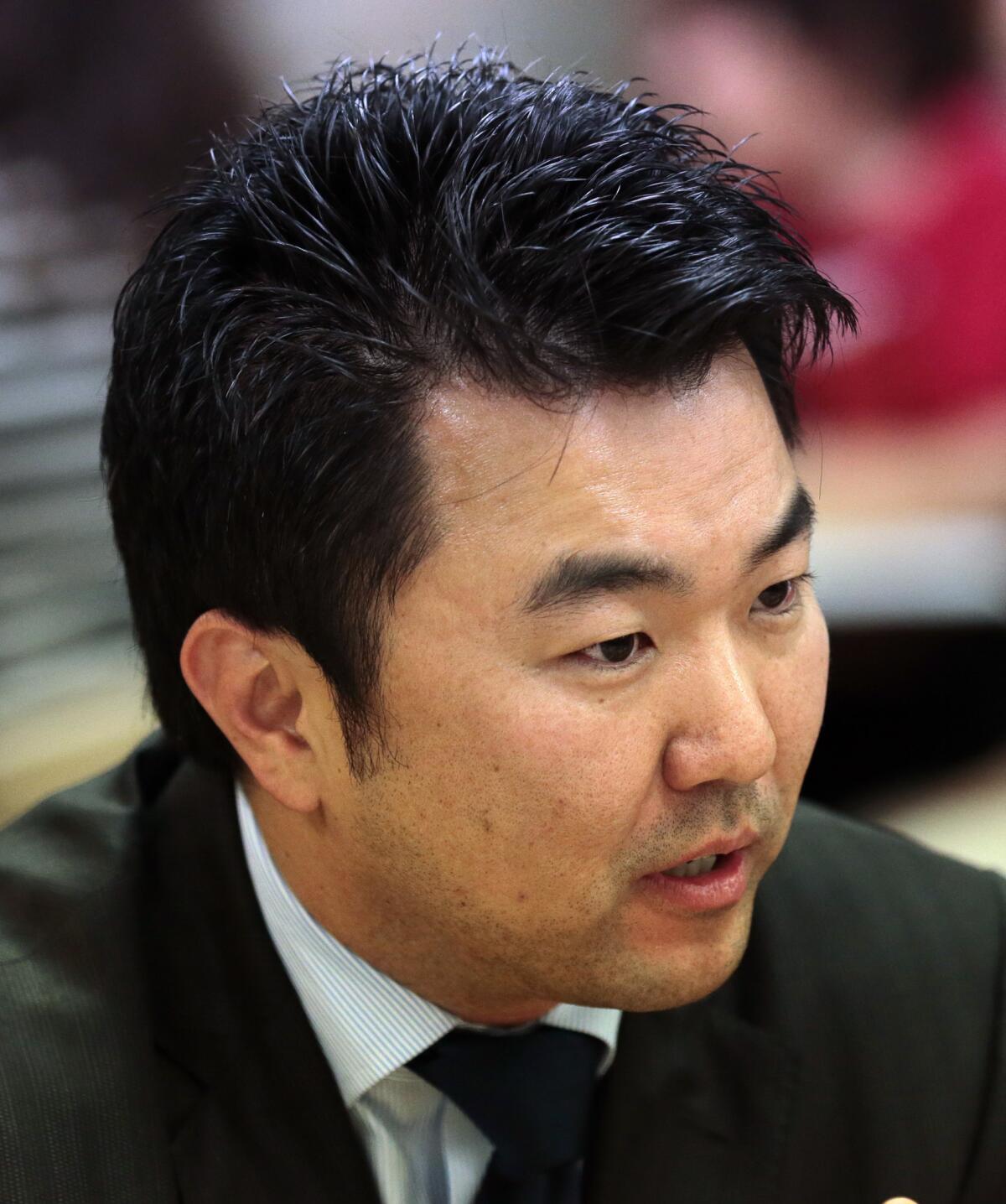L.A. City Council reverses decision that could have brought 250 apartments to Cahuenga Pass

David Ryu speaks at Notre Dame High School in Sherman Oaks on Jan. 21, 2015.
- Share via
The Los Angeles City Council Friday reversed a decision that could have allowed hundreds of apartments to be built along the Cahuenga Pass, to the chagrin of a local landowner seeking more than $30 million in damages from the city.
Ben Forat had planned to construct roughly 250 apartments on empty land he owned near Lake Hollywood. But he needed a zoning change to make it happen.
Two years ago, he worked out a plan with then-City Councilman Tom LaBonge. Forat said he offered to give roughly 10 acres of the land to the city to preserve as green space.
LaBonge, in turn, kicked off the process of rezoning the lower stretch of the land along Cahuenga Boulevard.
The City Council unanimously backed the plan last year, asking city officials to look into the zone change that would allow Forat to build hundreds of apartments instead of a much smaller number of larger homes. The council also asked the planning department to start the process of considering an amendment to the city general plan that could allow the proposed project.
Join the conversation on Facebook >>
“It would have been a good thing for the future of Los Angeles,” LaBonge said in a recent interview, arguing that access to green space would reduce pressure on other parts of the Hollywood Hills where neighbors have complained of being deluged by visitors.
But LaBonge left the council last year – and his successor balked at the idea and sought to roll back the decision. The new councilman, David Ryu, had defeated a LaBonge aide last year in a race that revolved around development concerns.
At a Friday hearing, Ryu said the city needed to start over on the Cahuenga Pass plans.
“We must work to restore trust in government,” Ryu said. “And what we have before us is the kind of action and the reason why the Neighborhood Integrity Initiative” — a proposed ballot measure that seeks to limit large developments — “is looming over our head. Lack of trust. Lack of transparency.”
Several neighborhood groups had been troubled by the building plans, raising concerns about traffic congestion, environmental effects and the way the plan had come about. Hollywood Knolls Community Club President David Savage told the council that the plans were “grossly inappropriate for the neighborhood.”
Though the prospect of a zoning change had been publicly vetted at City Hall hearings, community groups said they were late to hear about it and should have been informed earlier.
“It’s a project that no one knew anything about,” said Anastasia Mann, president of the Hollywood Hills West Neighborhood Council, which opposes the idea of building so many apartments.
Forat has defended his proposal, arguing it would ease traffic by expanding a narrow stretch of Cahuenga Boulevard, help put a dent in the area’s housing crisis and preserve green space for the city. Other multifamily housing is located nearby, making it “not out of the ordinary for the area,” he said.
“I gave the cow, the milk and the farm” to the city, Forat said. “Now they’re trying to take the farmer’s daughter too.”
The City Council initially voted to reverse its decision in April after discussing the issue behind closed doors. Forat’s attorney, Fred Gaines, accused the city of violating public meeting rules, so the council took a second vote Friday.
Forat and Gaines have filed a claim seeking more than $30 million from the city. It includes $400,000 in out-of-pocket costs for architects, civil engineers and other experts as well as $30 million in lost value from reselling the property.
Ultimately, Forat plans to sue the city, Gaines said.
The City Council vote last year was not the final seal of approval for the building plans: Only after a string of hearings could lawmakers give their final blessing to the zoning change and other adjustments to city rules.
But Gaines said the initial decision allowed Forat to press forward and begin the lengthy process of making his case to neighbors and city leaders.
By reversing themselves Friday, the council members “cut off the public process before it even started,” Gaines said. “It’s nonsense.”
City Councilman Felipe Fuentes, who opposed the move at the April meeting, raised a similar concern when the council first voted to reverse its decision in April. To cut off the rezoning process at this stage would send a message that, “with a lot of political pressure,” the council could make a final decision before the plan was even vetted, he said.
Ryu countered that it made little sense to continue the rezoning process in the face of community opposition.
“Why should we start from a point where it’s clear everybody is opposed?” he said Friday.
Krista Michaels, president of the Cahuenga Pass Property Owners Assn., agreed and said it was “entirely appropriate” to start over.
“Bring in all the communities that should have had input from the beginning,” she told the council.
Council members voted 11-0 Friday to roll back the decision they had made a year earlier. Fuentes was absent for the vote, along with council members Mitch O’Farrell, Mitch Englander and Paul Krekorian.
Follow @latimesemily for what’s happening at Los Angeles City Hall.
ALSO
Gov. Brown backs $2-billion plan to ease homelessness across California
U2’s The Edge and his decade-long fight to build on a pristine Malibu hillside
California voters to get chance to decide if cigarette taxes will go up by $2 a pack
More to Read
Sign up for Essential California
The most important California stories and recommendations in your inbox every morning.
You may occasionally receive promotional content from the Los Angeles Times.











